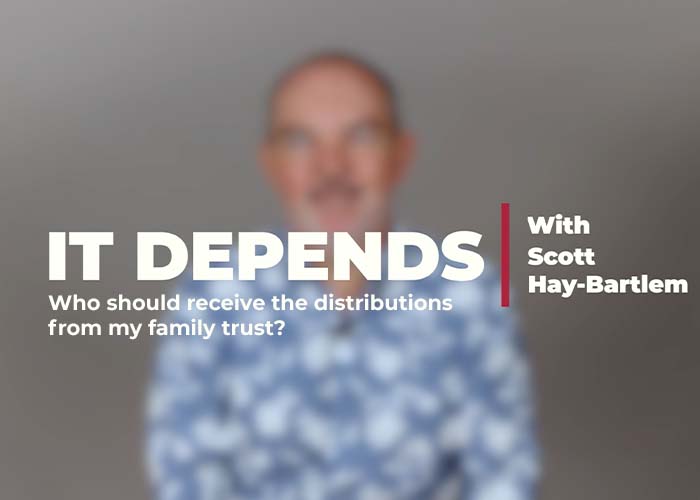In this edition of It depends, partner Scott Hay-Bartlem dispels common myths surrounding trust distributions. His message: don’t limit your focus to tax matters this EOFY – there’s much more to consider!
Join Scott in Sydney on May 8 and May 9 for a complimentary seminar tailored specifically for accountants and financial advisers. His presentation will provide an in-depth analysis of distributions from family discretionary trusts, just in time for EOFY.
The seminar will be hosted in three locations: Sydney CBD (nearly sold out!), North Sydney, and Parramatta.
Find out more!
Video transcript
So, welcome to this edition of It Depends where I’m going to talk about who should receive the distributions from my Family Trust.
Why do we care?
Making the decision about distributing the income out of our Family Trust is a really important one for a couple of reasons. The first one, most obvious one is tax, is that the person to whom we make the distribution includes the amount of the distribution in their income for the year. So, getting the tax position right is going to be really important. There’s a number of other factors to take into account as well. And one thing that people often forget is that when the trustee decides to distribute the income to somebody, you’re creating a genuine legal obligation to pay that amount to that person. Now, often we don’t pay that amount immediately or even for a number of years, and that’s a genuine debt owing to that person which can cause problems if that person has business risk issues, is going through a matrimonial dispute, or just decides that they’d like to call it from the trust. And that’s something we need to think about before distributing.
Can the trustee distribute to the person I want to distribute to?
So, this is our first ‘It depends’. Now, with a modern family discretionary trust, the beneficiaries are a wide class, a wide group, usually defined by reference to a particular person who’s named and then their family members, relatives, companies and trust charities. But before we actually make a distribution, we need to check that the person or company or trust or charity, is actually going to be caught within the class that we’ve got listed there. So, common things like spouses. Does it include people you’re not married to? Does it include same sex couples? Who is a ‘child’? And then if we’re going to related companies or trust, do they actually fit within the definition? Because sometimes they don’t.
Is the person excluded?
So, having decided that we can, the person is included in that class of beneficiaries, we also need to check that they’re not excluded and this will be in a different clause just to keep you on your toes. So, common exclusions are things like trustees. So, before we distribute to someone or a company that’s the trustee, we need to make sure they’re not excluded. Foreign beneficiaries are common exclusions because of various stamp duty land tax rules around Australia as well.
Do I need to consult with the beneficiaries about distributions?
So, a discretionary trust is called that because the trustee has a discretion as to whom it chooses to make the distributions. But there are some recent cases that are suggesting the trustees have to act reasonably and trustees need to take into account the circumstances of beneficiaries when making distributions. Now, those cases were more limited classes of beneficiaries. They weren’t a normal modern discretionary trust. But one thing to be conscious of is making sure that the trustee has fulfilled its obligations in making the distribution decision. And that may not be as easy as we think.
Do I need to make my distribution decision by 30 June?
This is our second, It depends. Now, the Tax Office clearly has the view that the trustee has to make the distribution decisions by 30 June. Now, the basis for that is that almost every trust deed says you have to. That’s the basis for why they say that. But not every trust deed actually does say that. Now, if your trust deed requires a distribution by 30 June, yes, you have to. If you have a trust deed that doesn’t have that obligation in, you at least have some arguments and there is some cases that support the fact that the trustee needs to make the decision within a ‘reasonable time’ after the end of financial year, which is not necessarily before 30 June.
Now, there’s a whole lot in this space and I’m going to Sydney on the 8th and 9th of May to run a series and to talk about trust distributions and the factors to take into account. I’ll cover these and some other things. So, if you’re in Sydney, North Sydney or Parramatta, love to see you at one of our sessions. Otherwise, if you’ve got any questions about this area, please contact a member of our Private Clients team. Thanks for watching this edition of It depends.





